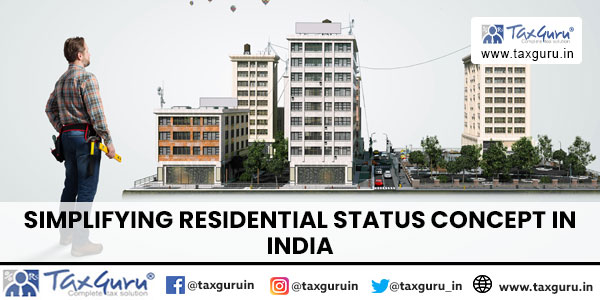A Deep Look with a Common Man’s Eye at Section 6 of the Income Tax Act
Understanding your residential status for tax purposes is crucial in India. For individuals and entities operating in the ever-evolving tax landscape of India, determining residential status is paramount. Section 6 of the Income Tax Act, 1961, serves as the cornerstone for navigating this crucial aspect. This introductory section delves into the significance of Section 6, outlining its role in establishing residency and its subsequent impact on tax obligations. We will embark on a journey to demystify the intricacies of this provision, providing a clear understanding of the various tests and considerations for both individuals and entities.
Section 6(1): Residential Status Provisions related to Individuals
This section outlines the conditions for an individual to be considered a resident of India in a particular financial year. There are three main tests:
- Number of Days Spent in Previous Year :
An individual is resident if they are physically present in India for at least 182 days during the previous financial year.
- Number of Days Spent in 4 Years Preceding to Previous Year:
- Residency is established if the individual has been in India for at least 60 days in the current year and for 365 days or more in the preceding four years.
- For Indian citizens or individuals of Indian origin with a total income (excluding foreign income) exceeding ₹15 lakh, the 60-day requirement in the current year is replaced by a 120-day requirement if they are not liable to tax in any other country.
- Exception for Seafarers and Those Employed Abroad:
Section 6 provides an explanation for these scenarios. Indian citizens who leave India:
-
- As a member crew of an Indian ship as defined in clause (18) of section 3 of the Merchant Shipping Act, 1958 (44 of 1958)
OR
-
- For employment outside India.
- Relaxed Rule: In such cases, the 60-day minimum stay requirement in the current year under the “Previous Year Test” is replaced with a 182-day minimum stay requirement. This allows them more time outside India while still maintaining resident status.

Section 6(2): Defining Residency for Entities
This section defines the residency of entities other than individuals. Here’s a simplified explanation:
- Hindu Undivided Family (HUF), Firm, or Association: A HUF, firm, or association of persons is considered resident in India if the control and management of its affairs are situated wholly within India during the relevant financial year.
Section 6(6): Resident and Ordinarily Resident [ROR] OR Resident and Ordinarily Resident [RNOR]
- This is a test that determines an individual’s residence in India. Fulfilling either of the following conditions qualifies an individual as ordinarily resident (ROR):
- Having been resident in India for at least two out of the ten preceding financial years.
OR
-
- Having spent at least 730 days in India during the seven preceding financial years.
Implications of Residency Status
Tax residents of India are liable to pay tax on their worldwide income, while non-residents are only taxed on income earned in India. Understanding your residency status helps determine your tax obligations and filing requirements.
Additional Considerations
- Section 6 is a complex provision with nuances and exceptions. Consulting a tax professional is recommended for specific situations.
- The concept of “not ordinarily resident” (NROR) also finds mention within Section 6, which impacts taxability.
Conclusion
Section 6 of the Income Tax Act serves as the foundation for determining residency in India. By understanding the different tests and implications, individuals and entities can navigate their tax obligations effectively. It’s important to remember that tax laws are subject to change, so staying updated is crucial.
*****
Disclaimer
- We request readers to seek professional advice before arriving at any decision/conclusion after reading. We are not responsible for any loss arising to anyone after referring and relying on this article. Above views are based on our understanding of the provisions
- Author can be reached at office.bhavikco@gmail.com





